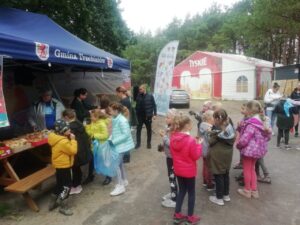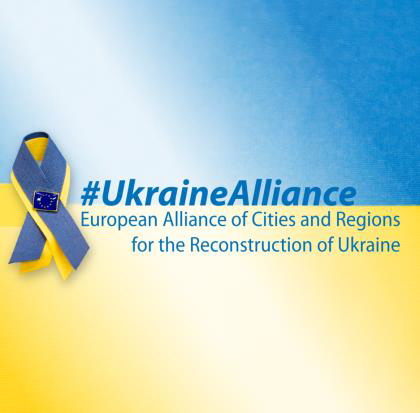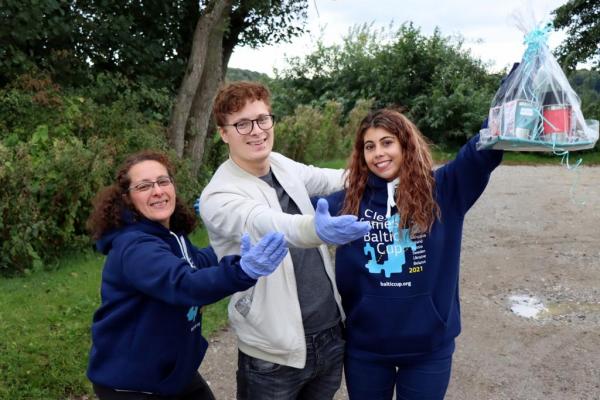Dwellers from eight Baltic countries joined the annual Clean Games Baltic Cup to clean up local areas. These are team competitions in waste collecting and sorting, where participants earn game points for the amount of garbage they have collected.
This year games were held in 8 countries. Poland, Latvia, Finland, Denmark, Estonia, Lithuania, Belarus, and Russia competed to win the Cup. The tournament started on the 18th of September, on World Clean Up Day. The last game of the Baltic Cup was held on the 26th of September. Competitions were implemented in partnership with environmental organizations Clean Baltic Coalition and Latvian Green Movement.
‘Usually we organise all of the games on World Clean Up Day. This year we have decided to prolongate the Baltic Cup, and make it a whole week – so that more cities can join. We are very delighted with the turnout – more than 20 tons of garbage had been collected!’ – says the founder of Clean Games project, Dmitry Ioffe.
Participants shared stories of interesting items they had found while playing the game. During the clean-up in Latvia, one of the contestants collected a dead fish in a box – the riddle behind this strange finding is still unsolved. In other places, people managed to find an old stroller, a vanity box and a lost cell phone. These artefacts helped players get their team forward, as they got extra points for these special discoveries.
Players had to face different challenges because of the bad weather conditions. Nevertheless, none of them gave up and took part anyway. In Saint-Petersburg the general council of Norway in Russia joined the game. He pulled a truck tire out of the river Neva, while standing barefoot in the cold water. In Belarus, games were held during a heavy rain. However, everything went well and the players were left very happy.

In Latvia, because of the strong wind, organizers had to switch off the generator in case it catches on fire. “Our electricity generator nearly caught on fire because of a really strong wind. So we had to continue the game count manually, with no electronics or internet!” – shared an organizer from Latvia. However, this incident didn’t stop the participants from having a good time, they accepted the challenge and had fun with it.
On 11th of October during a special live stream Clean Gems project announced the winners of this year’s Baltic Cup. The first place went to a team ‘Kartupeļi’ from Valmierā, Latvia. The second and third place went to teams ‘Lemmings’ and ‘X-team’ from Belarus and Russia respectively.
Michael Durkin, executive secretary at Coalition Clean Baltic, had complimented the project on it’s contribution to the environment and had announced that he will mention Clean Games as part of an action plan at next week’s HELCOM ministerial meeting. ‘The ministers of environment of the Baltic Sea countries will adopt the updated Baltic Sea action plan. And you are certainly in it!’ – said Michael.
Jānis Matulis, The Chairman of the Board at Latvian Green Movement also made an appearance and talked about the organisers’ input into the games. Julia Wolman, Project Officer at Nordic Council of Ministers, talked about the importance of international ecological projects and sharing of the best practices.

During a live stream, a Russian stand-up comedian Vera Kotelnikova gave a performance. She talked about plastic straws, zero-waste methodology and consumption. ‘Next year, I will be a participant!’ – said the comedian.
Clean Games have been conducting international tournaments since 2019 when the first Clean Games Baltic Cup became an annual September tradition. In 2020 seven countries took part in the second Baltic Cup, and in 2021 new records are expected. In 2020 Clean Games also extended the hand of cooperation to the USA, and 20 cities from both countries were cleaned simultaneously during an intercontinental tournament.
Information on the Clean Games project:
Clean Games are team competitions in waste collecting and sorting. During games players use our mobile app – just like Pokemon Go. Since 2014 more than 1500 games have taken place in 24 countries. From 30 to 1500 people take part in one game and collect from 0.5 to 20 tons for an hour. On average a player collects 5-10 times more waste during Clean Games than during traditional cleanups.
Photos from this year’s Baltic Cup games:
https://drive.google.com/drive/folders/1DNRl0bbE9C1VarNjALftFmomDzFAMUAa?usp=sharing
Contact Information:
Anton Zaitsev, Clean Games communication manager, tel.: +7 931 258 70 97, zaitsev@cleangames.org



